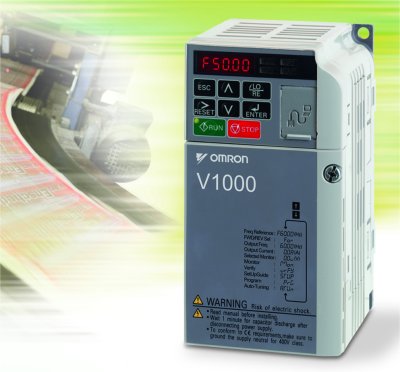Yaskawa aims for 20% of the global standard drives market
Yaskawa has revealed plans to replace almost all of its drives products over the coming three years. It hopes that the new products will help it to capture 20% of the global market for general-purpose drives in the 0.1–300kW range. It already claims to have a market-leading 13.4% share of global sales in this sector, and 11% of the European market.
The company, most of whose European sales are through its joint venture with Omron, is building a new drives factory in Japan and is expanding its Scottish manufacturing operation to cope with the anticipated growth in demand.
Every six months for the next three years, Yaskawa plans to launch a new range, with the first arrival being the V1000 general-purpose compact drive. The next launch – a replacement for the more powerful J7 family – is due to take place later this year.

Around 80 Japanese engineers worked for two years on the V1000 (shown above), with the aim of designing the world’s smallest inverter, capable of operating for ten years with no maintenance. The drive is expected to have a field failure rate of less than one in 10,000 installations. It is 40% smaller than the seven-year-old V7 family it will replace, uses half as many components, and is based on a processor that is four times faster.
Yaskawa has designed to V1000 to keep going for ten years without a service, running 24 hours day at an 80% load, in ambient temperatures of up to 40°C. It says that the drive’s expected field failure rate of 0.01% is half that of the V7 and considerably lower than most rivals
The V1000 is claimed to be the first compact inverter (below 15kW) to have safety functions built in as standard. In the event of an emergency, two independent safety channels can block the IGBT power (to EN 954-1, category 3). Yaskawa says that this facility will allow machine-builders to provide safety features with fewer components.
The V1000 provides open-loop current vector control of either induction or synchronous permanent magnet (PM) motors. This means that, for critical applications, users can opt for a PM motor, thus cutting the motor size by up to 70%, while boosting efficiency by up to 8%.
The current vector control is claimed to be more accurate than rival voltage vector techniques. The fast CPU allows I/Os to be refreshed every 1ms.
The drive is designed to respond to large changes in torque with almost no change in speed, even at frequencies as low as 1Hz. It incorporates continuous on-line auto-tuning, which reacts to changes in motor performance as they get warmer.
The V1000 uses larger IGBTs than are needed for normal duties, and can deliver 120% of rated current at 2kHz for a minute. This means that users will often be able to choose a smaller frame size than rival designs.
Parameters are set on a removable terminal board with screwless terminals. The drives can be programmed using drag-and-drop PC software, supplied at no extra cost.
Standard IP20 versions of the V1000 drives will be made at Yaskawa’s new factory in Japan, which will boost its production capacity by 50%. Work on the £16.7m factory began in January, and the first drives are expected to roll off the fully automated lines in July, at a rate of one drive every 40s.
IP66 versions of the V1000 will be made for the global market at Yaskawa’s Scottish plant, in Cumbernauld. Six new assembly lines will be installed at Cumbernauld from mid-2006 and the investment will eventually amount to around £1m. The number of employees is expected to rise to around 150 by the middle of this year (from about 120 a year ago).
As well as the new V1000 range, the Scottish factory will also be assembling water-cooled drives for the first time, as well as a new range of specialist drives for crane applications. Last year, a European Technical Centre was set up at the factory to increase the capacity for local development and modifications.
Most of Yaskawa’s drives in Europe are now sold through the joint venture that it set up with Omron in 2003, although Yaskawa still sells directly to large OEM customers. Antonio Farras, general manager of Omron Yaskawa Motion Control, reports that sales through the JV were worth €164m last year and he expects to pass the €200m mark by 2008.
Although Yaskawa is confident that V1000 drives will achieve their ten-year design lives, it has decided to offer a two-year warranty. Farras explains that the company didn’t want customers to feel that it was offering an extended warranty in response to reliability problems, as some other drives suppliers have had to do.





